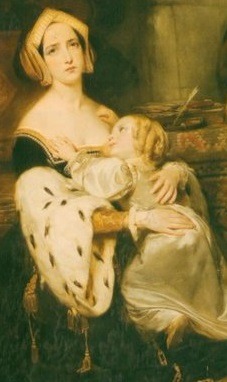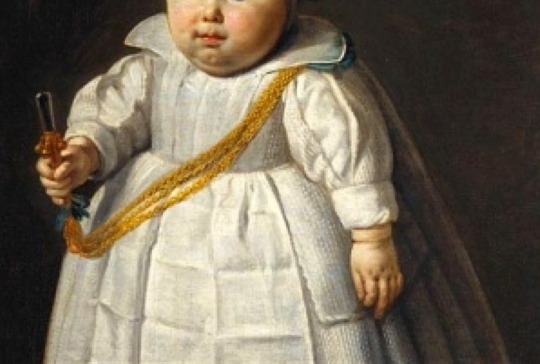 April 30, 1536 is the traditional date assigned to a story Elizabeth was told by Alexander Ales later in life about her mother holding Elizabeth in her arms and pleading for her very life with her husband, Henry VIII.
April 30, 1536 is the traditional date assigned to a story Elizabeth was told by Alexander Ales later in life about her mother holding Elizabeth in her arms and pleading for her very life with her husband, Henry VIII.Ales wrote to Queen Elizabeth, and he told her a narrative of her mother’s fall from his perspective. He said that Anne had rebuked Cromwell and Wriothesley for accepting bribes and selling offices to unworthy persons, and so they decided to destroy her with false allegations of adultery.
But he also included a touching scene that has been included in many fictional accounts of Anne’s fall, and in movie depictions, such as the one at the beginning of the post.
Never shall I forget the sorrow which I felt when I saw the most serene Queen, your most religious mother, carrying you, still a little baby, in her arms and entreating the most serene King, your father, in Greenwich Palace, from the open window of which he was looking into the courtyard, when she brought you to him.
I did not perfectly understand what had been going on, but the faces and gestures of the speakers plainly showed that the King was angry, although he could conceal his anger wonderfully well.
 If Ales did, indeed, witness Anne with Elizabeth in her arms, I’m not sure when it could have happened. Elizabeth wasn’t at court around the time of her mother’s fall.
If Ales did, indeed, witness Anne with Elizabeth in her arms, I’m not sure when it could have happened. Elizabeth wasn’t at court around the time of her mother’s fall.The princess had been at court for the Christmas festivities, and then was brought back by her father for the celebrations in January after Katharine of Aragon died, but Anne’s expense records show Elizabeth was at her own
household by January 18.
Anne ordered clothing for her daughter, and the tailor had to travel by river to Elizabeth’s lodgings to take measurements from the girl and do some mending. It would have appeared in the records as an expense if Anne had sent someone to retrieve the princess for such an appeal to the king.
In short, the story could not have happened as Ales claims, though one can certainly see the emotional appeal of such a scene, and why he would have included it in his tale. It adds a strong element of pathos to imagine a mother begging for her life with her baby in her arms.
Toward the end, there likely were many scenes in which Anne pleaded with Henry and he rebuffed her. She had tried everything to repair their relationship. But Henry was no longer enchanted by her charm. Her bright wit now irritated him. She could not even lure him into her arms, because he was experiencing problems in the bedroom, and knowing his personality, he likely blamed her for them. Henry wasn’t interested in reconciling with Anne. Instead, he wanted to hurt her as much as possible, rubbing his favor to Jane Seymour in her face whenever he could.
Anne likely would have recognized the futility of a gesture like bringing Elizabeth to court so she could plead with her. Henry’s affection for his children was mostly in that they were proof of his virility (a subject upon which he was extremely touchy), and that he saw his children as extensions of himself. Henry had been brutally cruel to his other daughter, Mary, and so attempting to appeal to his fatherly emotions was pointless - he had none.

No comments:
Post a Comment